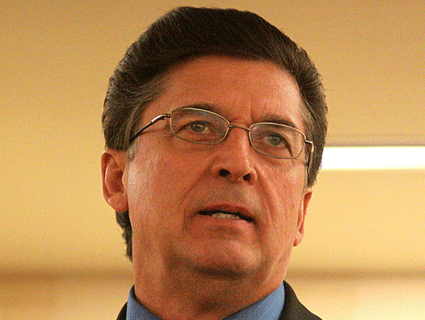
<a href="http://www.shutterstock.com">golden_sun</a>/Shutterstock
If Montana voters approve Gary Marbut’s referendum in November 2014, any FBI agent who tries to arrest a Montanan for a federal crime could be arrested—and charged with kidnapping.
Marbut’s “Sheriffs First” bill, which cleared a Montana state Senate committee last week, makes it a crime for a federal agent to take any law-enforcement steps without first getting permission from the county sheriff. The proposal already passed both houses of the Legislature once, in 2011, but was vetoed by then-Gov. Brian Schweitzer, a Democrat. This time Marbut, the Montana gun lobbyist and aspiring firearms manufacturer who wrote the bill, is hoping Montana voters will determine the fate of his legislation. If passed, the latest version of the Sheriffs First measure would become a ballot question in November 2014.
The FBI’s deadly 1993 raid on cult leader David Koresh’s Waco, Texas, compound might never have happened if the Sheriffs First law was in place, Marbut argues. The sheriff “could have said, ‘Look, I will call Koresh on the phone and he’ll meet at my office and you can ask him whatever questions you want. You don’t have to incinerate 100-and-some people.'” But under the Sheriffs First law, Marbut’s imagined conversation wouldn’t be the simple information exchange he describes. Instead, it would be a request for permission: The FBI would have had to ask the local sheriff before initiating a raid on Koresh’s compound—and the local sheriff could have said no.
That’s because the real focus of the Sheriffs First law’s isn’t interdepartmental communication; it’s de facto nullification. If a sheriff believes a federal law is in conflict with a state law, he could prevent federal agents from enforcing it. In designating local sheriffs as essentially a new form of checks and balances, Marbut’s bill would empower the very law enforcement officers who have been most critical of perceived federal overreach. As Reason reported last month, at least 90 sheriffs departments have pledged to not enforce any gun control laws they consider to be unconstitutional.
Constitutionally, Marbut and his sheriff allies are on shaky ground. Courts have long recognized that federal agents have free license to enforce federal laws. Marbut argues that the 10th Amendment allows states to ignore federal criminal statutes as they see fit, but the Supreme Court, which has never endorsed that interpretation of the amendment, is unlikely to agree.
Even Marbut allows that there are certain situations in which federal agents shouldn’t need a permission slip to take action. His bill as worded doesn’t apply to the activity along the US-Canadian border or on Indian reservations, which are policed—however sporadically—by the Bureau of Indian Affairs. There is a loophole for cases in which the target of the raid is, as is fairly common, the sheriff himself (the federal agency would get permission from the state attorney general). And in cases of “hot pursuit,” such as a high-speed chase, the agents would be allowed to pursue the suspect without hindrance.
For Marbut, a prolific lobbyist who has written 58 pro-gun bills that made it into law, the referendum would have an added benefit. An earlier law he wrote, which blocks the federal government from regulating in-state gun manufacturing, is tied up in the courts. But if his Sheriffs First measure became a reality, that would become an afterthought.
The ATF might say that “we have probable cause to believe that we have this person in your county who’s making firearms without a license,” Marbut explains. “And the sheriff might say, ‘Well, gosh, under the Montana Firearms Freedom Act, that’s protected activity in Montana, so you don’t have my permission for this bust.'”
For now, the bill’s top target is staying mum. FBI spokeswoman Kathleen Wright responded to a request for comment with a terse, “The FBI has no information to provide on this matter.” But William Vizzard, a retired ATF agent who now teaches criminal justice at California State University-Sacramento, was more vocal. The bill, he says, amounts to “[g]randstanding that will be destructive to relations between state and federal law enforcement.”
“If some yahoo sheriff tried” to enforce the measure, Vizzard says, “the federal courts will slap them down.”













